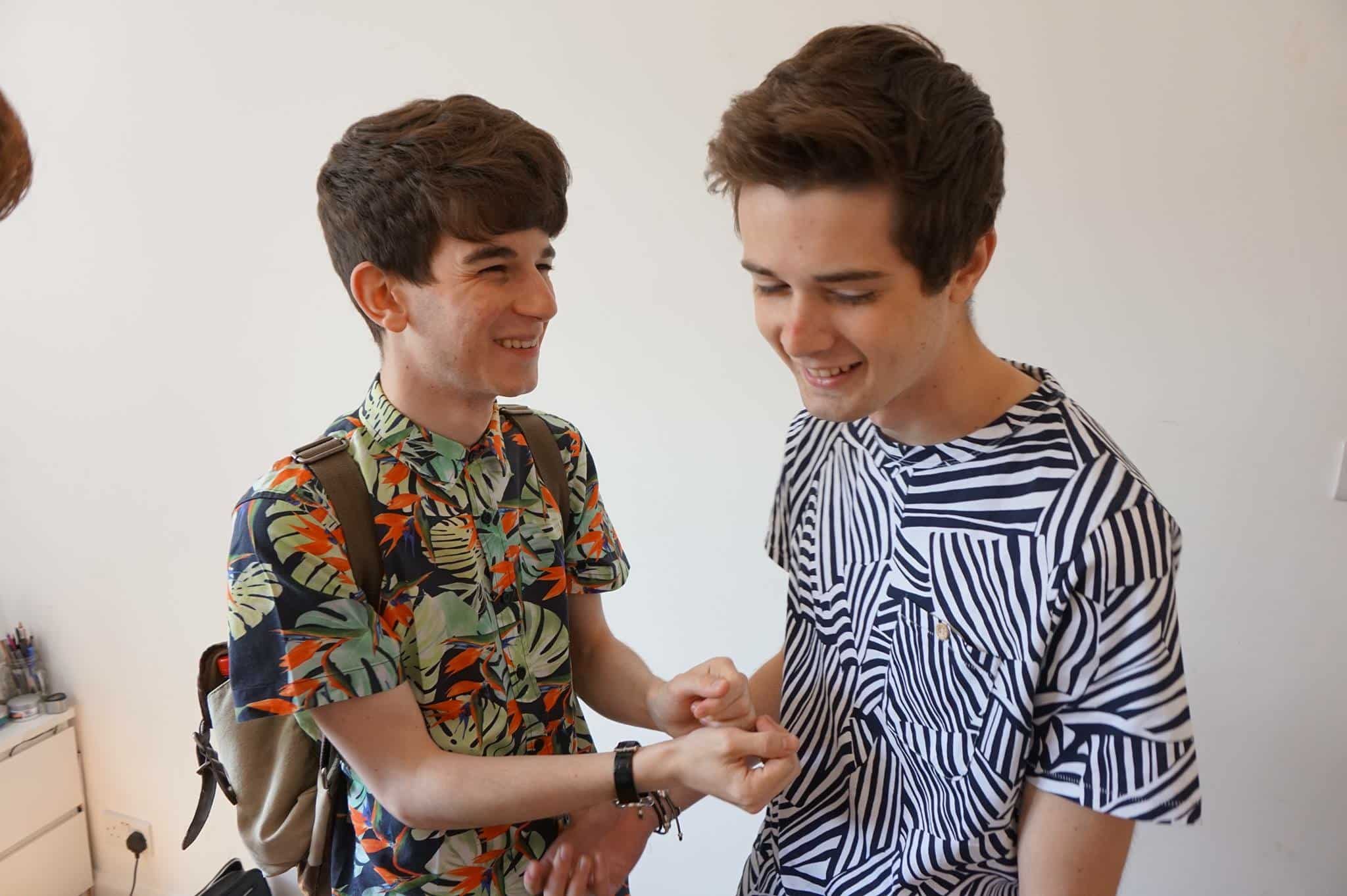
Adam Packer (L) and his late boyfriend Dean Eastmond who died from Ewing’s Sarcoma, a rare bone and soft tissue cancer. (Gavin Lomas)
Adam Packer check his ex-boyfriend’s Twitter feed most days. He lost his ex, journalist Dean Eastmond, to a rare cancer five years ago.
Dean died in 2017, at just 21, after losing a battle with Ewing’s Sarcoma, a bone and soft tissue cancer.
The messages he shared on Twitter continue to be a “source of comfort” to Adam, who says he uses Dean’s account to recall the memories they shared.
But now, under Elon Musk’s new Twitter rules, he could lose that emotional support and Dean’s digital legacy too.
Musk plans a “purge” of all accounts that have been inactive for more than a year – and this includes Dean’s.
Adam, who’s 28 and from Milton Keynes, tells PinkNews Elon Musk needs to invest care in Twitter by protecting the inactive accounts of late loved ones.
As well as looking at inactive accounts, Packer wants the billionaire, who is so fond of labelling accounts, to add a memorialising feature for lost loved ones.
Left my ward today to spend time at home. If I’m dying, I’m so happy it’s these NHS angels making it as comfortable as possible for me ❤️ pic.twitter.com/FnXFATrFoH
— Dean Eastmond (@deanvictorr) August 22, 2017
“People like Elon Musk need to recognise platforms like Twitter have very deep, sentimental and emotional value for people that he might not recognise as significant or substantial,” he tells PinkNews.
“Whatever does happen with Twitter it should at least be guided by the care Elon has failed to invest so far”.
Adam says the threat of losing Dean’s account stems from a “collection of issues” which have surfaced since Musk took over the platform earlier this year.
His fears became reality following the billionaire hinting at deleting accounts that have remained inactive for more than one year.
Definitely
— Elon Musk (@elonmusk) November 1, 2022
“What Musk needs to do going forward is recognise not only the financial value of Twitter, but also the emotional value,” Adam continues.
“Not just to him as a business owner, but also emotional value to its users who have invested a lot in our accounts, in our tweets, and in the relationships and social connections we’ve established through Twitter.
“I really advise Elon to use the ethics of care, not just towards his users, but also his staff.
“Maybe if he invested a bit more care into the way he’s going about this he might see more fruitful outcomes to what he’s doing.”
Adam points out that Musk should perhaps rethink “changing everything up the moment you buy something”.
But aside from joking about Twitter’s new owner, Adam admits it’s “frustrating” to see Twitter considering removing inactive accounts three years after he successfully batted away the insensitive idea.
In his argument against Twitter deleting inactive accounts, Adam said in 2019 that Dean’s “journalism and activism would be forgotten” if his account were removed and he spoke about how important it was to “preserve” his tweets.
“It’s a little frustrating for me that three years after the incident, we haven’t got any further to working out a solution for how to deal with the accounts of deceased people, and what to do to memorialise those accounts.”
‘Digital legacies are slowly being siphoned away’
Adam references Facebook’s memorialising feature as a useful feature in maintaining people’s internet legacies.
After being diagnosed in 2016, Dean wrote candidly about his cancer treatment and LGBTQ+ discrimination within healthcare in his magazine HISKIND – a queer culture magazine he founded to benefit the queer community.
Adam notes “the issue with the internet is it isn’t stable… it’s constantly changing”, and adds: “Even Dean’s magazine HISKIND is no longer owned by him or his business partner.
“It adds to the sense of loss, like his digital legacies are slowly being siphoned away by the changing policies of these companies.”
Although Adam doesn’t check Dean’s Twitter daily, when he does, he says it acts as a “source of comfort”, brings him “warmth” and sparks a lot of memories.
“If I happen to be thinking of Dean or if there’s a memory or something that springs to mind, it’s a source of comfort.”
But he admits revisiting their past can sometimes prompt “a sadness and darkness” too.
“As time has gone by there are inevitably things I’ve forgotten, or that I hadn’t engaged with, or that were too dark for me to engage with at the time.”
Having recently secured a job in Birmingham, where Dean was treated at the young person’s unit at the Queen Elizabeth Hospital, Adam has looked back at posts to recall “how great the nurses were at treating him”.
He says Dean’s tweets allow him to “reconnect” and recall moments he missed due to focusing on being his carer.
These tweets remain “really fundamental and important” to him and for Dean’s legacy, “which was his social media impact”.
Preserving the legacy of young queer people
Should inactive accounts of lost loved ones be deleted, Adam worries the world will miss out on seeing the legacy of young queer activists, like Dean.
“We need to work out a way as a queer community of storing these young queer people who have built their career on social media and the internet and think about how to log those type of memories.
“The reason why I’m so loud about this issue is that there’s other people who will get diagnosed with Ewing’s Sarcoma and who will want to find other queer people who battled it.
“It’s really important to me to ensure there’s still information about that and what it’s like to be a queer person with cancer. That’s what I’m trying to preserve here.”








